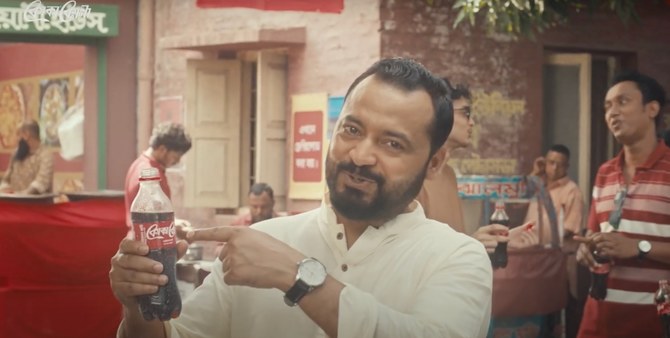
NN Online Report:
Coca-Cola is under fire in Bangladesh for a recent ad aiming to distance the brand from Israel in the wake of a significant boycott resulting from the war on Gaza.
The 60-second video, which first aired on Bangladeshi TV and YouTube on June 9, shows a shopkeeper interacting with a buyer who no longer drinks Coca-Cola as it comes from “that place.” The place is not named in the clip, but seconds later it becomes clear that the reference is to Israel.
The shopkeeper says that Coke “is not at all from that place” and that it “also has a factory in Palestine,” after which the reluctant buyer orders and enjoys the drink, reports The Arab News.
Social media accounts of Coca-Cola Bangladesh were soon later flooded with comments from Bangladeshis responding to the claims.
Coca-Cola Co. has been enjoying close links with Israel since the 1960s. In 1997, the company was honored by its government for “refusing to abide by the Arab League economic boycott of Israel.”
It owns dairy farms in illegal Israeli settlements in the Jordan Valley and a plant in the occupied Golan Heights.
In this context, the advert was for Bangladeshi viewers like Sohel Rahman, a businessman from Dhaka, an “attempt to fool the audience” by twisting the facts.
“Do they think the Bangladeshi people are stupid?” he said.
Sadia Ahmed, an executive from Dhaka’s Gulshan area, saw it as a “mockery” and misinformation.
“The campaign hid this information deliberately to play with the sentiments of the Bangladeshi people. The advertisers thought it would help boost its sales. But the result was the opposite,” she told Arab News. “Now, our boycotting campaign is even stronger, as Coke directly supports Israeli aggression on Palestine.”
While Coca-Cola removed the ad from its social media channels on Wednesday and no longer aired it on local TV, the video continued to make the rounds on social media, drawing comments like: “This feels desperate,” “This advertisement is trying to fool innocent people,” or “Boycott the actors too.”
Saraf Ahmed Zibon, the actor playing the main character in the ad, took to Facebook earlier this week to say he “had never been in favor of Israel” and had presented information and data that was provided to him by Coca-Cola.

The issue of Israel is very sensitive in Bangladesh, where many people say they can relate to the Palestinian struggle and resistance to Israeli occupation, and advocacy for Palestine is officially part of the country’s foreign policy.
Anything undermining the sentiment is unacceptable, especially when people “are dying every day in Gaza due to the Israeli aggression,” said Dr. Rasheda Rawnak Khan, associate professor at the Department of Anthropology of Dhaka University.
“It’s very much clear that this new Coke advertisement is political propaganda. This propaganda can’t be accepted in any case. It hurts the sentiment.”
Since the beginning of the newest Israeli onslaught on Gaza in October 2023, the Bangladeshi government and people have been repeatedly denouncing the deadly bombardment that has killed at least 37,000 Palestinians, destroyed most of the medical infrastructure in the besieged enclave, and displaced 80 percent of its population.
Part of the protest and mobilization in Bangladesh is a movement to boycott Western brands perceived as having links with Israel.
Coca-Cola’s attempt to win Bangladeshis back has resulted in the opposite.
“Coke failed to internalize the sentiment of 180 million people of Bangladesh … and made this socially and culturally (insensitive) advertisement to re-brand in the local market,” Prof. A.S.M. Amanullah, sociologist from Dhaka University, told Arab News.
“The attempt has backfired … I believe, in a couple of weeks, Coke’s sales could be reduced to 50 percent.”
Coca-Cola Bangladesh has not responded to repeated requests for comment about the commercial and its sales in the country.
A drop in demand has already been observed since October and has plunged further since the beginning of this week, with local soft drink brands coming to the fore.
“Last week, the demand was four times higher … A significant part of Coke’s annual sales used to happen during Eid Al-Adha. But this year, it seems that the total sales of Coke will fall drastically,” said Arifur Rahman, a grocery store owner at Dhanmondi, Dhaka.
“Usually, during summer, we used to sell a huge amount of Coke. But the demand started to decline from the beginning of the Gaza attack. The boycott campaign dealt a blow to Coke’s selling graph. Nowadays, people hardly ask for Coke. Instead, they are opting for different local colas.”
